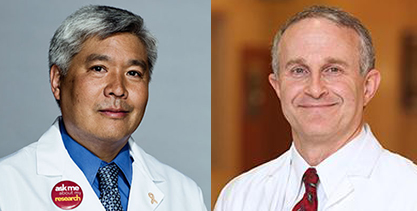July 1, 2015:
A conversation with Douglas Yee, MD, director, and Jeffrey Miller, MD, deputy director, of the Masonic Cancer Center, University of Minnesota, which is a member of the Big Ten Cancer Research Consortium (Big Ten CRC):
Q: How do you think cancer research will change in the next 10-20 years?
Douglas Yee, MD (DY): In the coming years, patients will see more precise and personalized therapies due to targeted tumor profiling. Personalized medicine is the wave of the future, and we’re excited to have some incredibly strong researchers in areas like bone marrow transplant, NK cell research, and cell products.
Jeff Miller, MD (JM): Here at the Masonic Cancer Center, we are addressing this shift by investing resources into space, equipment and most importantly, recruitment of talent for a new Translational Genomics in GI Tract Cancer (TGG) team. By creating a transdisciplinary team focused on a common goal, backed by extensive support and infrastructure, we plan to be intentional about finding answers to therapy resistance, for example.
Q: What does translational science look like within your institution and in your collaboration with other Big Ten Cancer Research Consortium member institutions?
DY: As the only state-supported research university in Minnesota, we are dedicated to translational science. To that end, we’ve have stacked our deck with all the disciplines necessary to perform any type of translational research – from biomedical engineering to medicinal chemistry to computational science.
JM: Our cancer center core grant gives us a great support, and it’s provided us with opportunities to focus on translational work. Our TGG team, for example, is focused on big ideas – and translating them to the bedside. One of our greatest playgrounds for big ideas right now is in genomics, and in drug manufacturing.
DY: We know the depth of faculty in broad disciplines is one of the greatest ways to promote big ideas. We’re dedicated to supporting our faculty, through getting folks set up with lab space, equipment, whatever they need to focus on translational research. Our medical school is incredibly supportive and motivated to help us focus on the TGG team.
Q: In what ways is your institution involved in expanding access to clinical trials throughout the communities you serve?
JM: We work closely with community partners on enrollment and conducting cancer clinical trials throughout the state of Minnesota in rural, suburban, and urban satellite and affiliate sites. We have positioned ourselves to offer cutting edge care to all Minnesotans via clinical trials offered at M Cancer Care clinics close to our patients’ homes.
About the Big Ten Cancer Research Consortium: The Big Ten Cancer Research Consortium creates a unique team-research culture to drive science rapidly from ideas to treatment-changing paradigms. Within this innovative environment, today’s research leaders collaborate with and mentor the research leaders of tomorrow with the unified goal of improving the lives of all patients with cancer.
About the Big Ten Conference: The Big Ten Conference is an association of world-class universities whose member institutions share a common mission of research, graduate, professional and undergraduate teaching and public service. Founded in 1896, the Big Ten has sustained a comprehensive set of shared practices and policies that enforce the priority of academics in the lives of students competing in intercollegiate athletics and emphasize the values of integrity, fairness and competitiveness. The broad-based programs of the 14 Big Ten institutions will provide over $200 million in direct financial support to almost 9,500 students for more than 11,000 participation opportunities on 350 teams in 42 different sports. The Big Ten sponsors 28 official conference sports, 14 for men and 14 for women, including the addition of men’s ice hockey and men’s and women’s lacrosse since 2013. For more information, visit www.bigten.org.

















Subscribe to the Big Ten CRC Newsletter X
X Facebook
Facebook YouTube
YouTube